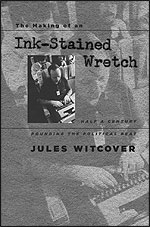One of the things political reporters love to do is sit around telling old “war” stories about their trade, often while sipping adult beverages. Those who love such tales will find a rich trove of them in Jules Witcover’s new memoir, “The Making of an Ink-Stained Wretch.” Something else reporters love to do is sit around complaining about the business, about how it’s changed, and about how it isn’t just the same as it used to be. There’s plenty of that in Witcover’s book, too.
Unfortunately, there’s not a lot in this book about what we should do to correct things. Witcover pens us a witty book about our trade, grumbles about how things have gone wrong, but then doesn’t offer a plan for doing anything about it. But, then, Jules is an ink-stained wretch, not some cluck-clucker at one of those journalism school seminars. One retired colleague of mine once observed “no one does a job as well as you did it,” and there’s a dash of that in Witcover’s book.
Still, after bemoaning some of the things gone wrong with the trade, he concludes charitably: “All in all, the business of writing about national politics is in as good, if perhaps more sober, hands as it was in my earlier days. Today’s crew is probably better educated in various aspects of political science than my gang was, but maybe not quite so well versed in the art of having a helluva good time in the process of writing about it.” Thank you, Jules. And amen.
What’s Happening Now?
Political writers today are more “content providers” than reporters. When you’ve got to be up before dawn for an early morning TV or radio talk show, then cover an event or two, file a brief story for the Web site, then a full story for the paper, make calls and send e-mails to collect string for Sunday pieces and columns, well, there just isn’t the time for early morning tennis or high-fat, high-alcohol, late-night dinners. (Oh, I forgot to mention the blog you are expected to write from the road and how cell phones and BlackBerries mean discussing everything you do each day with the half-dozen editors back home, all of whom think they know more about politics than you do.)
Sadly, political reporters do all of this for years and, as Witcover and other colleagues have discovered, as a reward some get a letter saying their services are no longer needed because the Pooh-Bahs are cutting back on political coverage so they can spend money on other things or make the shareholders happy.
Maybe it’s time to give up trying to reform the trade. Having been to all sorts of talks, seminars and think-tank discussions about how we can do it better—only to go out and sin again in covering the next campaign—I’ve pretty much given up hope of salvation. We’re journalists, for crying out loud. As Witcover chronicles, we’re in a raw, raucous and rough business. We get up every day, review yesterday’s screw-ups, and try to get it right for tomorrow or for the next broadcast, podcast, cablecast or blog entry.
My problem with books like this one is they tend to convey a sense that things were great back in the good old days, and they weren’t, a fact Witcover notes. Those who pine for the “good old days” ought to sit down with old newspapers or fading film clips and see for themselves. There weren’t a lot of female bylines. You didn’t see many black or Latino faces, either.
Today’s times aren’t the good old days, thank goodness. In many ways, they’re better. But some of what ails American political journalism in our time is an overreaction to the failures of the boys back in Witcover’s heyday. After the presidencies of Lyndon Johnson and Richard Nixon turned out so badly, news organizations came increasingly to the realization that voters would benefit by knowing more about the personal character of those seeking political office. Reporters responded by starting to dig into the private lives and personal backgrounds of politicians who, understandably, drew back, thereby creating the distance between them and us that Witcover bemoans.
In my generation of political reporters, all of us grew up reading Theodore White’s fly-on-the-wall stories of presidential campaigns. With his approach in mind, suddenly the tactics, strategies and personalities of the campaign people behind the scenes were a lot more interesting than the speech of the day. But, again, more barriers came up, and news coverage changed again; this time reporters started to put too much emphasis on the horserace. Now the “story” is often no longer out on the trail, but is found in the details of campaign finance disclosure statements. Or reporters flock to a candidate’s hometown to discover what makes him or her tick. Or they vet position papers with experts to write more intelligently about what a politician is proposing.
The road story—the campaign—becomes nothing more than scripted political theater. And if those who cover it aren’t as interested in getting drunk every night on the trail, it’s because we’ve got heavy lifting to do. Frankly, too, it’s a life that can be hard on the reporters’ personal lives, as Witcover recounts happening to his own. Early in my career I was lucky to hear that wisdom from guys in his generation. “Don’t forget your family. Don’t forget your marriage,” they advised. If that means passing up some event or road duty, well, that’s just too bad. Our jobs are stressful enough without wrecking marriages or not knowing our kids. Still, it’s good to hear one of the veterans of our business give us tykes a little blessing of approval.
Today we inundate people with information, thanks to various communications technologies that didn’t exist even a few years ago—cable, the Internet, blogs, podcasting. The cacophony is noisier than in Witcover’s era, but it’s still better than the alternative of providing only a few sources of information for voters. The problem now is that there’s so much of it out there, people often don’t know where to turn for basic facts. Add to this the unfortunate possibility that we might be returning to an even older set of “good old days”—to those times of yellow journalism and the partisan press. Citizens didn’t turn to those newspapers for unbiased information. They went there to have their biases reinforced and passions inflamed. Jules Witcover and David Yepsen might not like this trend, but Benjamin Franklin would recognize it instantly.
Don’t look to Witcover’s book for an in-depth probe of such questions. It’s a comfortable read. Anyone interested in reliving some of the old days of this business will find that his stories bring a smile with them. (It’s also best accompanied by a Scotch or two.) What he has to say is also useful for students interested in political journalism, since he offers a front-row look at our trade the way it used to be. It is a book written by one of the best in our business, as he shares his thoughts about the challenges political journalism faces and what aspiring reporters are in for if they join. Come on in. The ink is fine.
David Yepsen is The Des Moines Register’s political columnist.



